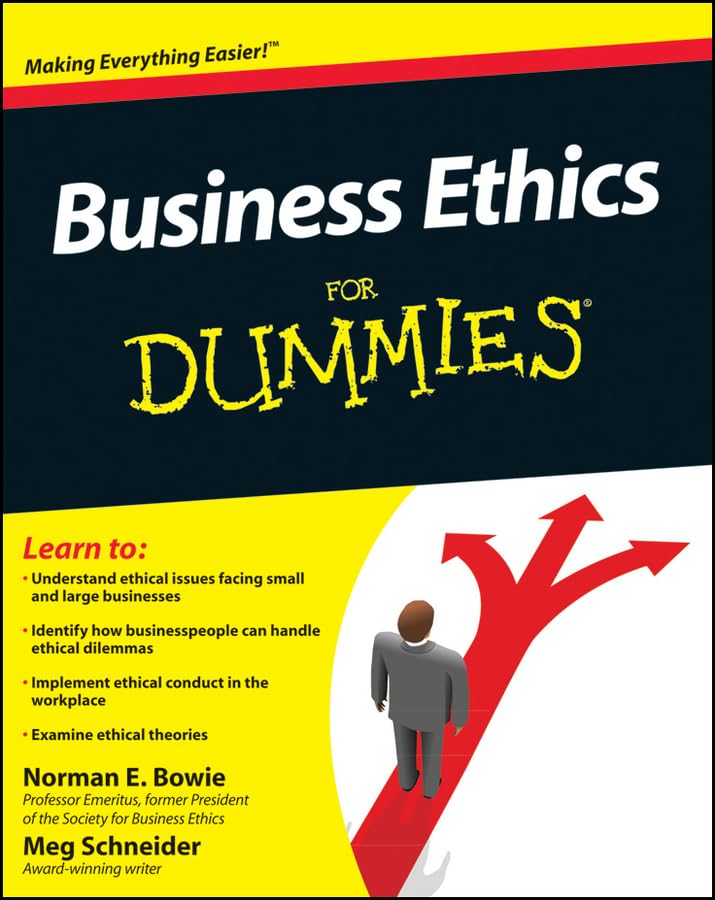

📈 Elevate Your Ethical Game—Because Integrity is the New Black!
Business Ethics For Dummies is a must-have paperback that demystifies the principles of ethical decision-making in the business world. With expert insights and real-world case studies, this guide empowers professionals to navigate complex dilemmas and foster a culture of integrity in their organizations.
E**N
Worthy of a read
This is a great book. Makes ethics easy to understand with its vignettes. Although most people want to do the right thing, they don't always know what to do and this book helps illustrate what is right.
J**S
Business ethics-- a crisis in America today-- a light-hearted but useful look
A good overall view of business ethics. Something simplified but to have any depth the book would have been three times as long. Light-hearted, perhaps overly so on a subject of vital importance today. The lack of business ethics is a critical problem. I wish also that the authors had spent time suggesting things that business people could do to improve business ethics in our current society. The problem is that we might not be able to do anything at all.
A**H
Very good info, low key, history, different perspectives, case studies
The Dummies series is not for dummies, but pretty stimulating and challenging intellectually. The kick is Dummies books in generally well organized, with bold subheadings, a good review section uniform to all Dummy books in the back and standardized icons for memory aids. Business Ethics for Dummies is the kind of book everyone would want to buy for their boss as an end of the year gift. Author Norman E. Bowie is a previous author on the subject of ethics and professor emeritus at the University of Minnesota.Business Ethics for Dummies draws the line and helps you distinguish between what is legal and what is ethical, what is legal is not necessarily ethical, and how you can apply that in real terms. The universal virtue honesty is emphasized, with plenty of examples good and bad. Don't lie to the public or to your employees, if something should be said, say, honestly that you are not at liberty to say, rather than make up a story. The history of ethics is considered from Aristotle, the Ten Commandments, the Golden Rule to the modern day interdenominational code of ethics. It also considers ethics from the point of various major religions as well as Native Americans.The book endeavors to sell the reader on the long-term benefits of ethical behavior. Profits are acknowledged, it isn't promoting saintliness, but helping business people in all sectors, including managers in profit and non-profit institutions such as those in public sectors, religious organizations and education, to treat workers fairly and reasonably. Bowie also emphasizes transparency in business.Bowie explains the dangers of Groupthink and Tunnel Vision in a company, as well as the need for honest communication up the ladder to the top, a corporate culture that welcomes suggestions rather than squelches anything negative that it might be important for decision makers at the top to hear.The book sometimes is a bit didactic in nature, it contains many real life examples of corporate ethical models and breaches, but repeats several egregious accounts of unethical behavior a couple of times too many. Other than those small annoyances, it flows pretty well, logically, and with little or no hype. Bowie acknowledges that perfection is not the goal, but that if an individual or company has a fairly good track record, minor ethical lapses are often forgiven and forgotten.The book is a low key, deliberate effort to stimulate ethical behavior and attitudes, with some valuable information of benefit to anyone with any large or small degree of responsibility in the working world. Lots of good advice here for everyone from the bottom of any company to the top. It would also be a suitable high school textbook for a course on ethics. For anyone who has suffered from any ethical breach, who hasn't, it is a good self-improvement tool.
J**N
A very basic primer
I realize the concept behind the "for dummies" brand is to provide extremely simplified information that anyone can follow. So in that regard, the book does what it sets out to do. If you have no real world business knowledge, this book will provide you with all of the basic information you need to form a rudimentary business ethics policy. But while it may help you develop a business ethics policy, it won't help you put that policy into practice, which is where most companies fail. It does reference the "slippery slope" concept: the fact that while most people are honest, we often overlook the small things as no big deal, and over time what constitutes a small thing gets bigger and bigger. But the book doesn't really provide a lot of insight insofar as how to prevent that in the first place.I got the feeling at points that in an attempt to provide a "balanced" perspective, the authors were afraid to make a stand. And that is unfortunate, because the core of ethics is doing the right thing all the time. Even when it might not be the popular thing or the politically correct thing. This was particularly true in the section on lobbying and PACs, where the authors went to great pains to tell the reader that lobbying and PACs are not in and of themselves unethical. They fall into their own trap of overextending the common meaning of the word to the point that the "small lobbying" done by individual citizens is treated the same as corporate lobbying efforts.If you've never had a business ethics course or worked significantly in a business environment, this book is a nice overview. But for those looking for real guidance on surviving the pitfalls and traps of corporate ethics (or lack thereof) this book is of little use.
Trustpilot
3 weeks ago
1 month ago